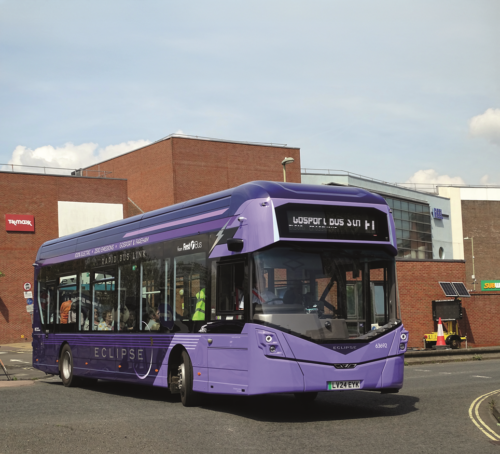
Over the last few months an electric and low-emission bus revolution has quietly been transforming the air that the city’s 208,100 residents breathe. Richard Sharman takes a look at the current situation and Portsmouth City Council’s future plans
The south coast of England is well known for being blessed with hot and sunny weather for a good proportion of the year when compared to other areas of the country, but it now has something else to boast about: its public transport system.
Whilst Southampton and Bournemouth have seen further investment in Euro VI vehicles for bus companies’ fleets in recent months, Portsmouth has gone one step further and committed to transforming how the public travels through a large investment in electric buses, with Portsmouth City Council, Hampshire County Council and FirstBus working together to deliver a large fleet of Wrightbus GB Kite Electroliners.
To find out more, CBW spoke to a man who is very qualified to comment on all things bus on the South Coast: Peter Shelley was the co-founder of Solent Blue Line in Southampton in 1987, which today trades as Bluestar as part of Go-South Coast. Peter went on to become Head of Passenger Transport at Hampshire County Council and his current role finds him as the Transport Development Manager of Portsmouth City Council.
Where it all started
“Portsmouth is the UK’s only island city and it is the most densely populated place outside of parts of Central London, with lots of Victorian terraces due to the Royal Navy dockyards, which were the city’s main employer,” Peter explained. “We only have three roads on and off the island, and only one railway line. This means that traffic speeds are quite slow and congestion is quite heavy. Air-quality is an issue.
“We have had a series of air quality directives from the Government due to the poor air quality, so in November 2021 Portsmouth became only the second city in the UK to introduce a chargeable Clean Air Zone (CAZ) that covers taxis, private hire vehicles, coaches, buses and heavy goods vehicles.
“As part of that scheme we got funding that delivered the retrofitting of 105 buses with improved exhaust systems to ensure that the exhaust emissions of all buses serving the CAZ area complied with Euro VI standards. Coach operators could also apply for the funding to upgrade vehicle if they had regular services. Funding was also available for taxis.
[…]By subscribing you will benefit from:
- Operator & Supplier Profiles
- Face-to-Face Interviews
- Lastest News
- Test Drives and Reviews
- Legal Updates
- Route Focus
- Industry Insider Opinions
- Passenger Perspective
- Vehicle Launches
- and much more!


